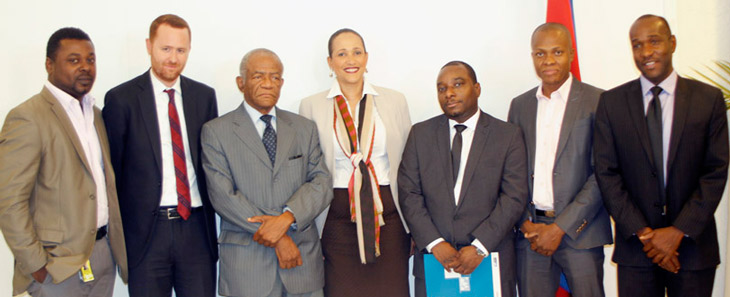The Health Policy Project ended in 2016. Work continued under Health Policy Plus (HP+) until 2022.
NEWS & VIEWS

IBESR Director Mme Arielle Jeanty Villedrouin at the July workshop
Health Policy Project/Haiti
PETION-VILLE, Haiti—In partnership with the Institute for Social Welfare and Research (l’Institut du Bien-Être Social et de Recherches, or IBESR), the HPP AKSE project in mid-July organized a high-level workshop to discuss the "Adoption Reform Act" in Haiti. The new law, passed in October 2013, was designed to enshrine the principle that international adoptions should be considered above all as a measure to protect the welfare of children and to ensure that children’s best interests are taken into account in adoption proceedings.
“The workshop was an important opportunity to talk together about how the new law will be implemented,” says Philippe Cantave, director of the USAID-funded HPP AKSE project, which advocated for passage of the law. “Following the 2010 earthquake, Haiti attracted a lot of interest as a source for international adoptions, and local groups interested in child welfare and protection were concerned about irregularities in the child adoption process. The government wanted to improve the legal framework for child protection, and we’re proud to have provided technical support for that effort.”
The workshop aimed to strengthen the technical capacity of groups involved in child protection through better knowledge and understanding of the Adoption Reform Act, as well as to promote better cooperation between judicial authorities and groups involved in social protections.
"We have to be sure that adoptions are conducted in the best interest of the child," said IBESR Director Mme Arielle Jeanty Villedrouin at the July workshop, noting that some children are put up for adoption due to family circumstances such as poverty. Nearly 80 percent of young children in the country’s 770 existing orphanages have at least one living parent. "This is why we want to strengthen ties between administrative authorities, judicial authorities, and all those involved in child protection," she said.
The workshop helped to familiarize participants, including judges, lawyers, mayors, state officials and other civil servants, children’s homes, heads of chartered adoption agencies, and embassies with the new procedures required under the law and their roles in ensuring child protections. Additional workshops will be held throughout the country to ensure that members of the judiciary in different regions are well informed about the law.
The HPP AKSE program (for Aksyon Kolektif pou Sekirite kont Eksplwatasyon, which means “collective action for security against exploitation” in Creole), supports multisectoral efforts to improve the policy environment to strengthen human rights protections and expand access to services for vulnerable groups. The program works with civil society networks and key government institutions for child protection, and to strengthen sexual and gender-based violence (SGBV) prevention, response, and treatment services. It builds local capacity to reduce discrimination against vulnerable groups, including sexual minorities, and works on policy issues, including monitoring implementation of human rights in multisectoral services.
For more information on reforming the adoption law in Haiti, see http://www.healthpolicyproject.com/index.cfm?ID=publications&get=pubID&pubID=390
For more information on HPP AKSE, see http://www.healthpolicyproject.com/index.cfm?id=country-Haiti
About the Health Policy Project
The Health Policy Project (HPP) aims to strengthen policy, advocacy, governance and finance for strategic, equitable, and sustainable health programming in developing countries. Led by Futures Group, HPP AKSE builds on Futures Group’s 30 years of working in Haiti, and is a continuation of the earlier AKSE project led by CARE International. HPP is funded by the U.S. Agency for International Development. The Health Policy Project is implemented by Futures Group in collaboration with Plan International USA, the Futures Institute, Partners in Population and Development, Africa Regional Office (PPD ARO), the Population Reference Bureau (PRB), RTI International, and the White Ribbon Alliance for Safe Motherhood (WRA).
What's New
- Something to Build On: “Innovation Exchange” Celebrates the Health Policy Project’s Close and a New Beginning
- What Will it Take for Tanzania to Achieve ART Targets and Ensure Long-Term Sustainability of the HIV Response?
- Helping Kenya’s County Leaders Advocate for Increased Health Investments
- HPP Holds Working Meeting on Ensuring Responsible PEPFAR Transitions for Key Populations
- Health Policy Project Celebrates 2016 International Women's Day
- HPP Staff Participate in White House Conference on HIV Stigma Reduction

